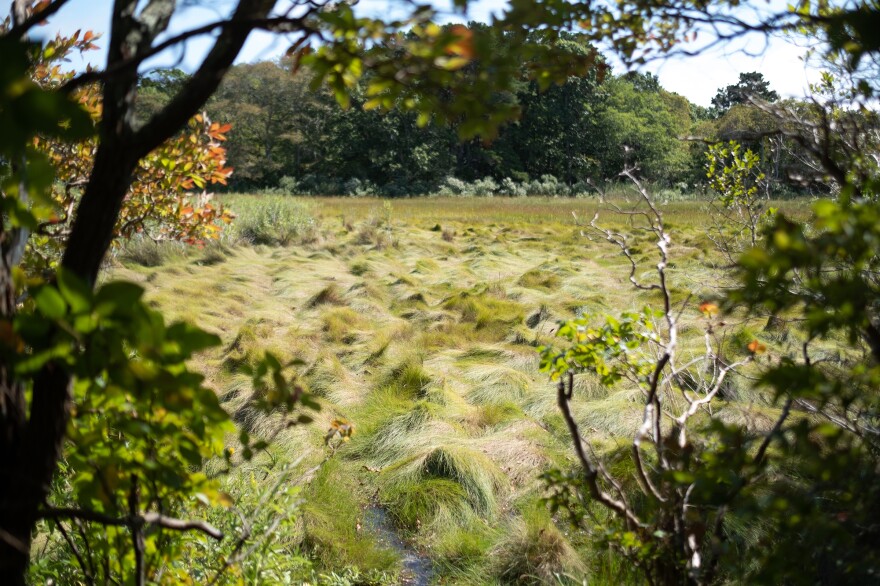When people ask Tamar-kali where she's from, it can be a frustrating conversation.
"They want me to be able to compartmentalize it in this really neat package," she says, "like, 'Oh, well, I'm Jamaican,' or 'Oh, I'm Nigerian.' And it's like, 'No, boo, my people were literally kidnapped and enslaved and brought to America, and I'm the descendant of enslaved Africans and indigenous folk,' you know. It's like people just don't like the truth — and we're seeing that manifested so aggressively right now."
She used to channel her own aggression into rock music.

But before Tamar-kali became a singer, rocker, and now a celebrated film composer, she was going to be a teacher. Having grown up in Brooklyn, she studied education at nearby Adelphi University. Music quickly reeled her back, but she remains an educator at heart — especially on tough subjects our country is still grappling with.
"I figured out a little while ago," she says, "that whether I want to be engaged this way or not, that for certain people I'm going to be a frame of reference for my people, for who I am — whether it's women, whether it's queer folk, whether it's Black folk — and I can either just lollygag and do it by default, or I can do it with intention. And I decided to do it with intention."
Her latest intention is a digital opera short called "We Hold These Truths." The 12-minute work for voice, spoken word and small orchestra was commissioned by LA Opera as part of their Digital Shorts series. Tamar-kali used the opportunity to teach a musical class on the ongoing fight for civil rights, and to do that she picked poems by three Black intellectuals. The first is "We Wear the Mask" by Paul Laurence Dunbar, which she set to a demented waltz.
"It's pushing against the grain in certain spots, in terms of the intonation, some rubs, some dissonant things that are happening," she explains, "which I guess represent a manifestation of what it is like to wear the mask."
For the past few years, Tamar-kali has been composing music for films like Mudbound and Shirley.
This commission gave her a chance to flip the script and have a director set a film to her music.
"I knew that she was thinking about the not-newness of this moment, she was thinking about the ahistorical way that America acts, as if each moment of racial reckoning for justice is new," says dream hampton, the Emmy-nominated director of Surviving R. Kelly and an old friend of the composer's. "She wanted to remind America, remind whoever might engage this piece, that we are on a continuum, and that there have been radical movements."
Initially, Tamar-kali was just tired — tired of explaining the long and nuanced history of the philosophical struggle for civil rights in this country to folks who don't share her literacy on the subject.
"There is definitely a throughline to this moment, historically," she says, "and there are tons of receipts if you ever want to look at them. I was calling this [opera] 'The Receipts' out the gate, because so often I hear people talking about issues of equity, and I'm like, 'How can you talk on these issues when you literally have no frame of reference?' So I just wanted to provide some receipts for those who might be interested."
hampton's short film is an abstract companion to the opera. It opens with sweeping shots of two young Black girls exploring a grove overlooking an unnamed coast. She was inspired by reading about the garden next to the African Grove Theatre — "they called it the 'pleasure garden, where negros could have conversation and ice cream.' I never got that description out of my mind."

In the second part of the opera, a solo violin aspires to patriotism under the words of "I, Too" by Langston Hughes. The violin continues playing, as tenor Ashley Faatoalia sings words that Tamar-kali wrote herself: "Oh Elijah / oh my soul."
This was her response to the killing of Elijah McClain, a Black 23-year-old, by Colorado police officers in 2019.
"It wrecked me," she says. "You could be the most innocent, loving person in the world, playing violin for stray cats, be a masseuse who's all about just trying to achieve a higher level of consciousness and love — and they will kill you. I didn't know what I could do. But I could write something."
The final third in this time-traveling triptych is a setting of "If We Must Die" by Claude McKay.
"It's a torch song, like straight up," she says. "The thing about Claude McKay is that he so succinctly expresses his love for himself as a man, and his commitment to his dignity."
Tamar-kali is intentionally bridging the worlds of film and music, and excitedly entering the opera space — something she's wanted to do for years. She's currently an artist-in-residence with OPERA America, developing a full-scale work that she's had in mind since her early twenties. Back then, "the only path to opera was through conservatory or university," she says. "There were no training programs or workshops or anything of that nature, to kind of look for talent outside of those halls."
That's partly why she first turned to the punk rock scene, where she could thrash out her "post-colonial, post-Catholic angst."
But even then, her lyrics grappled with colonization and genocide and other topics she's now weaving into her more classical work. "People might just be having a good time and, you know, moshin' or dancin'," she says, "but it's always been there."
Copyright 2023 NPR. To see more, visit https://www.npr.org.




